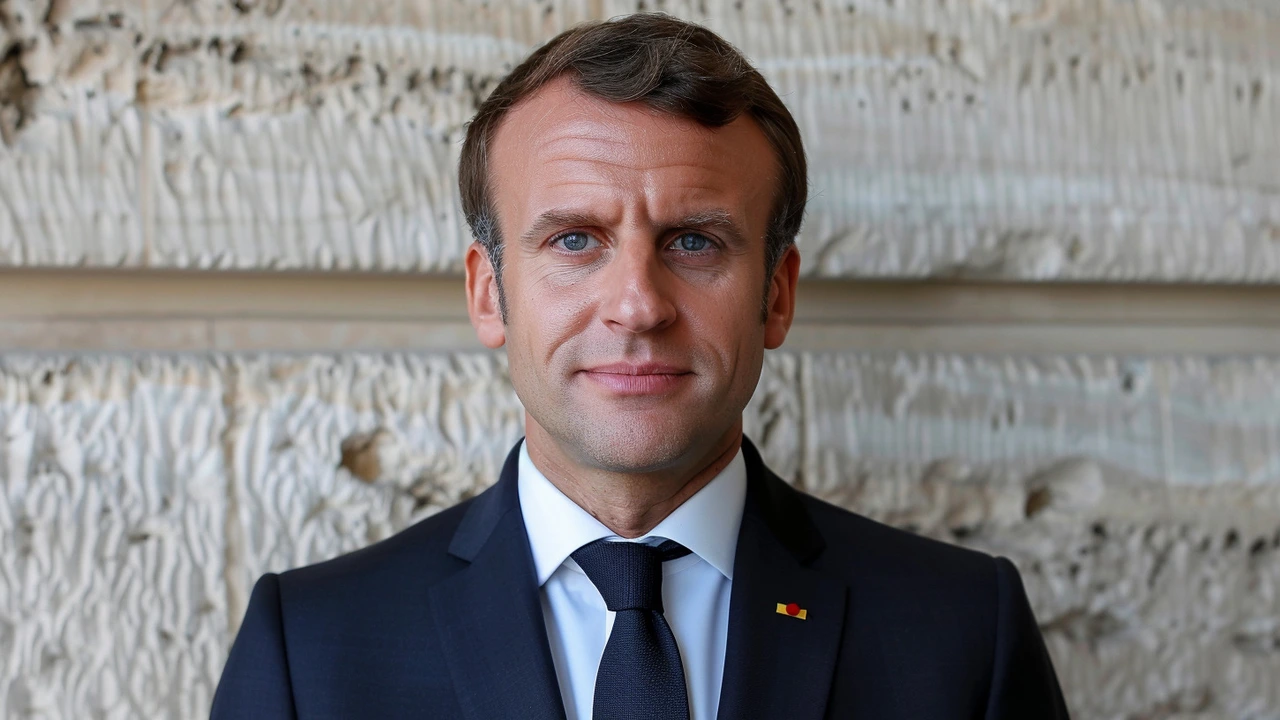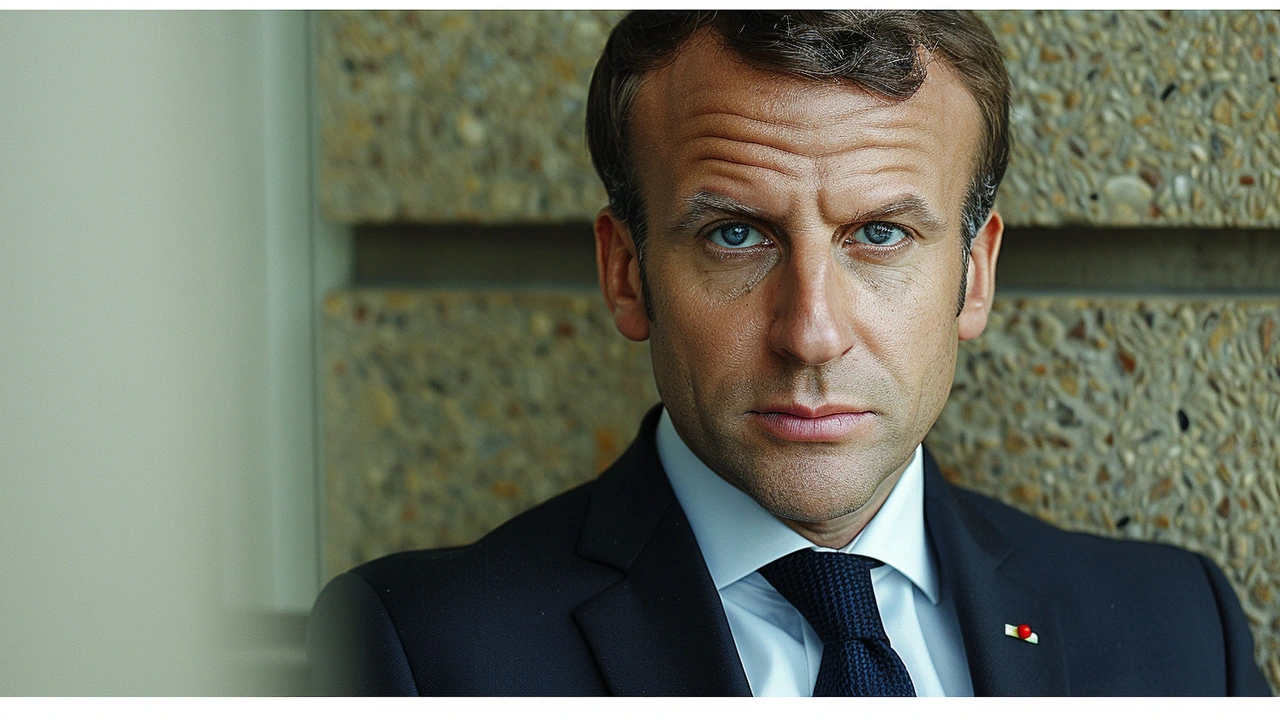10 Jun 2024
- 19 Comments
Macron's Bold Move Instigates Snap Elections Amid Rising Far-Right Support
French President Emmanuel Macron has shocked the nation by announcing snap national elections, a decision spurred by the growing popularity of his far-right rival, Marine Le Pen, and her National Rally (RN) party. This unanticipated move comes on the heels of the European Parliament election results, where the RN claimed approximately 31% of the votes, sharply eclipsing the 14.6% secured by Macron's centrist Renaissance Party and its allies.
The decision to dissolve parliament and schedule early elections represents a high-stakes gamble for Macron, one that has ignited a storm of debate among political analysts about his motivations and the potential consequences. Some view it as a desperate attempt to reassert his political authority, while others see it as a calculated risk to expose the vulnerabilities of the RN in a full-scale national election.
Marine Le Pen’s RN stands poised to make significant gains in the upcoming elections, set for a two-round voting process on June 30 and July 7. With Macron currently holding 169 seats in France's lower house of parliament compared to the RN's 88, the possibility of a dramatic shift in the balance of power looms large.
Poll Predictions and Potential Outcomes
An Ipsos poll suggests that the RN could potentially secure between 243 and 305 seats in the upcoming election, potentially granting them a majority in Parliament. If that comes to pass, Marine Le Pen could become France’s prime minister, profoundly influencing domestic and economic policies. Macron, retaining the presidency, would maintain control over foreign policy, justice, and defense, setting the stage for a possibly conflicted and divided government.
Observers note that this election could reshape the political landscape of France, one of Europe's core nations. Le Pen's ascent marks not just a pivotal moment for the French political scene but also one with significant ramifications for the European Union, particularly given her party's historically Eurosceptic stance.

Economic and Market Reactions
The immediate aftermath of Macron's announcement was felt acutely in the financial markets. The French stock market tumbled by 1.8%, reflecting investor anxiety over the upcoming political uncertainty. French banks, in particular, suffered substantial losses, and the euro dipped by 0.4% against the dollar. These market movements underscore the high economic stakes of the forthcoming elections, with both domestic and international investors keenly watching how the situation will unfold.
Market analysts suggest that the volatility could continue as the election dates draw nearer. Depending on the oversight and decisions made by the RN, there could be long-term implications for economic policies, particularly around regulation and trade. Businesses and investors may face an era of uncertainty if Le Pen's party secures a commanding presence in parliament.
Public Sentiment and Political Maneuvering
Public opinion on Macron's strategy for snap elections is divided. Some French citizens view it as a brave move to directly address the shifting political tides, while others see it as a reckless gamble that could further destabilize an already divided nation. The unprecedented nature of the snap election in modern French history adds layers of complexity and intrigue.
Political experts are also scrutinizing the timing and manner of Macron's announcement. With widespread dissatisfaction and the Yellow Vests protests that have characterized his presidency, Macron’s decision could be perceived as a maneuver to solidify his weakened political standing or as a strategic error that could backfire spectacularly.
Potential voter turnout and engagement will be critical factors in determining the election's outcome. Historically, high voter turnout has favored Macron's centrist and progressive policies, whereas lower turnout tends to benefit more radical parties like the RN.

Strategic Implications for the Future
The elections are expected to be a defining moment not just for Macron or Le Pen but for the broader spectrum of French politics. Should the RN secure the projected seats, France might witness a drastic policy shift, impacting everything from immigration to economic reform. Alternatively, a strong performance from Macron and his allies could reinforce the centrist and pro-European agenda.
Political strategists are keenly monitoring how various other parties position themselves leading up to June 30. The potential for new alliances, the role of smaller parties, and their influence on the larger political narrative will be critical to observe. The stakes for the upcoming elections are undeniably high, with potential repercussions to be felt not just in France, but across Europe. As the nation braces itself for these pivotal elections, the resulting shifts in power and policy will likely shape the future direction of both French and European politics for years to come.


Karthik Nadig
June 10, 2024Macron just handed the far‑right a free ride! 😡
Charlotte Hewitt
June 16, 2024Looks like the deep state is pulling strings again, using the snap election as a smokescreen for their agenda.
Jane Vasquez
June 21, 2024Oh great, another political circus – as if Macron needed another reason to be the punchline of Europe’s comedy show. 🙄
Hartwell Moshier
June 27, 2024It is a big risk but maybe it will work.
Jay Bould
July 3, 2024From a cultural standpoint, France thrives on debate; this snap election could be an opportunity for citizens to reaffirm their republican values.
Mike Malone
July 8, 2024The decision to dissolve the National Assembly at this juncture invites a plethora of constitutional reflections.
One must consider the historical rarity of snap elections in the Fifth Republic, a tradition that has rarely been broken.
Such a maneuver could be interpreted as a calculated gambit to reassert executive primacy in the wake of waning parliamentary support.
Yet the specter of unintended consequences looms, particularly when the electorate is polarized between centrist aspirations and far‑right fervor.
From an institutional perspective, the balance of power between the Presidency and the legislature may be irrevocably altered.
Moreover, the potential for a fragmented coalition in the subsequent Assembly raises questions about legislative efficacy.
Economic markets, as already evidenced, react with palpable anxiety, translating political volatility into tangible financial tremors.
Investors, wary of policy unpredictability, may withdraw capital, thereby exacerbating fiscal strain.
On the societal front, the French populace, still scarred by the Yellow Vests unrest, may either rally around a familiar figure or drift toward disenchantment.
A high voter turnout traditionally benefits pro‑European parties, yet the current climate suggests a possible abstention that could advantage extremist factions.
In the broader European tableau, the ripple effects of a potential RN ascendancy could unsettle the delicate equilibrium of the Union.
Neighboring states would monitor closely, anticipating shifts in immigration, trade, and security policies.
Thus, the strategic calculus extends beyond domestic borders to the continental stage.
In sum, Macron's gamble intertwines constitutional daring with political risk, a combination that history will judge with either admiration or censure.
Only the ensuing electoral verdict will illuminate whether this bold move was a masterstroke or a miscalculation.
Pierce Smith
July 14, 2024While I respect the democratic process, it would be wise for all parties to seek a constructive dialogue rather than a confrontational showdown.
Abhishek Singh
July 19, 2024Macron's move? Classic lazy politics – just hope the voters sort it out themselves.
hg gay
July 25, 2024I get why people are nervous – sudden elections can shake markets and hearts alike. 😅
But remember, France has weathered storms before, and its institutions are resilient. 🗼
Let's hope the turnout is strong and the conversation stays civil, for everyone's benefit.
Owen Covach
July 30, 2024Snap elections are like a roller‑coaster – exhilarating for some, terrifying for others.
Pauline HERT
August 5, 2024This is a direct attack on the secular, republican core of France, and we must push back.
Ron Rementilla
August 10, 2024Analyzing the data, it’s clear that voter fatigue could tip the scales in unexpected ways, so parties must adapt swiftly.
Chand Shahzad
August 16, 2024Colleagues, let us foster inclusive debates and ensure that every citizen feels represented, regardless of the outcome.
Eduardo Torres
August 22, 2024Stay hopeful, friends – even in turbulent times, democratic resilience shines through.
Emanuel Hantig
August 27, 2024In moments like these, empathy becomes a political necessity; we must listen to the anxieties of the electorate while guiding them toward informed decisions.
Byron Marcos Gonzalez
September 2, 2024One cannot help but marvel at the theatricality of modern French politics – a veritable pageant of ambition and intrigue.
Chris Snyder
September 7, 2024For anyone seeking clarity on how these snap elections might affect the Eurozone, feel free to ask; happy to break it down.
Hugh Fitzpatrick
September 13, 2024Well, if this was a reality show, we'd be at the cliffhanger episode.
george hernandez
September 18, 2024Remember, every political storm passes; the key is to keep our eyes on the horizon and support one another through the turbulence.